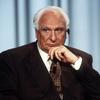
Date of birth: May 2, 1930
Birthplace: Teramo (Abruzzo)
Education: Degree in Law, Urbino University
history
Marco Pannella was until recently a household name in Italy. A firebrand radical who began his political activities when he was a univerity student in the early 1950's, Pannella was only 20 when he was put in charge of university programs by the small, pro-business Liberal party and only 23 years old when he became president of UNURI, then the major association of university students.
Before long his early militancy
was to catapult him on to the national political stage. In 1955 he helped
form the Radical Party, a small, gadfly, anticlerical, antimilitarist
civil rights oriented party that can be credited with helping to bring
Italy into the 20th century from a social point of view.
In fact, in 1963 when he became
party leader, he launched the first pro-divorce campaign (success was
achieved in 1974) which was to be followed by a successful battle to introduce
legal abortion (1981) Under his charismatic leadership, the Radical's
major weapon became that of the popular referendum, which in Italy can
be used to abrogate a law (such as those barring divorce and abortion).
Other campaigns were not successful, suchas that calling for the legalisation
of marijuana and other "soft" drugs. In 1976 he was elected to the Chamber
of Deputies for the first time and, in the same year to the European Parliament
in Strasbourg to which he has always been returned.
Pannella also had a career as a journalist (in 1960 he became Paris correspondent for the Italian daily, Il Giorno) but his principle metier has always been political protest. In 1968 he was arrested in Sofia (Bulgaria) where he had gone with other militants to demonstrate against the Soviet invasion of Czechoslovakia. It was on this occasion that for the first time he staged a major, Gandhi style, hunger strike
Pannella has fought more passionately and consistently for civil rights issues than anyone else in Italy, staging major campaigns for freedom of information, transparency in government bureaucracy, conscientious objection, legalisation of soft drugs, sexual freedom and against war, hunger and government financing of political parties.
Unfortunately, in recent years his party's exaggerated and repeated use of referendums (at one point there were about a dozen on the ballot at one time) has turned off many Italians and, consequently, made him less effective.
The Radicals have also moved further to the right on the political spectrum and - perhaps fortunately - are now no longer always viewed as "political correct"